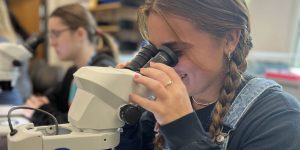Academics at Hanover:
As a Biology student at Hanover, you will become immersed in the study of living things. Gain valuable field experience in the remarkable forests, wildlife refuges and state parks located nearby and on our 650-acre campus overlooking the Ohio River – an ever-changing outdoor classroom.
Work directly with professors in class and modern labs and participate in the Biology Department’s Summer Research Program, which provides you with real research experience working directly with top scientists in the fields of Animal Behavior, Evolution, Botany, Immunology, Development, Genetics or Systematics. Our students receive outstanding preparation for many careers, including medicine, dentistry, veterinary and related fields, and have a remarkable record of acceptance into professional schools and in establishing notable careers in the biological sciences.
PARTNERS IN LEARNING
Because they focus on creating the next generation of scientists, Hanover’s award winning Biology professors mentor students closely and engage them as colleagues. That mean’s you will think critically, solve problems and use science to better understand the world around you.
- Learn from passionate professors in lectures to explore how life works.
- Engage in professor-led labs that focus on inquiry and learning how science is done.
- Conduct hands-on research in collaboration with processors at a level often reserved for graduate students at research institutions.
COURSEWORK AND STUDY OPTIONS
Environmental Biology
Genetics and Developmental Biology
Zoology
Botany
Cellular and Molecular Biology
Ecology, Evolution, and Behavior
Pre-professional training (Medical, Vet, Dental, PA, Optometry)
GRADUATE PLACEMENTS
Among the thousands of career options available to biology majors, careers of recent graduates have included:
Doctor of Medicine
Doctor of Osteopathic Medicine
Optometrist
Research Scientist
Nursing
Dentist
Veterinarian
Physician’s Assistant
Pharmacist
Professor
Medical assistant
Science Teacher (Secondary Education)
Zookeeper
Lab Technician
Environmental Consultant
Field Biologist (Natural Resource Agencies, State and Federal)
Graduate and Medical School placements have included:
Auburn University (Vet)
Baylor University
Bellarmine University (Nursing)
Clemson
East Tennessee State University
Marian University (DO)
Marymount University (Nursing)
Missouri State University
Indiana State University
Indiana University (MD)
IUPUI
Purdue University (Vet)
University of Arizona
University of Iowa
University of Louisville (MD)
University of Pikeville (DO)
University of Kentucky (MD, MD/PhD)
Western Kentucky University
RESEARCH OPPORTUNITIES
Hanover College’s biology program will provide you with opportunities for research in a variety of fields.
- Work directly with faculty during the school year or during the summer as part of the Summer Research Fellow’s Program
- Students routinely present findings at regional and national conferences (recent talks at: Indiana Academy of Science, Evolution Meetings, Animal Behavior Conference)
- Students take their research to the next level by publishing in peer-reviewed scientific journals (recent student papers in: Journal of Freshwater Ecology, Ethology, Ecology and Evolution)
- Our student researchers are frequently at the top of their programs, earning numerous awards
- Fulbright scholar
- Research Experience for Undergraduates (National Science Foundation)
- Numerous STAR grants for students presenting at conferences
- Numerous Richter Grants for off-campus independent research
- Rivers Institute Grants for Independent Research
- 3 consecutive years of student researchers winning the Taylor Award for Student Publishing
Recent Research Projects include:
- Faunistic surveys of insects in Indiana forests
- Evolution of ant-associated behavior in beetles
- The role of female choice in sexual selection in Eastern newts
- Clutch-level behavioral differences in the antipredator behavior of wood frogs
- Predator-prey interactions between opossums and toxic salamander species
- Tree-ring dating of National Historic Landmarks
- Mechanical treatment of invasive Autumn Olive
- Seasonal growth analysis of mesophytic forests
- The impact of eye development on craniofacial structure in Zebrafish
- Genetic variation in forensically-important dermestid beetles
- Effects of MMP9 on aging
TRAVEL AND STUDY ABROAD OPPORTUNITIES
- Take advantage of our spring travel courses to learn about the ecology of the Appalachian Mountains or the tropical biology of Central America.
- Study biology abroad at the University of Wollongong, Australia.
- Conduct research on coevolution between garter snakes and newts in the Western United States (Utah, Oregon, California).
- Present the results of your research at state and national scientific conferences.
SUMMER RESEARCH FELLOWS IN BIOLOGY
Designed to give students the opportunity to participate in scientific research, the Summer Research Fellows program emphasizes experiential learning in one or more different biological sub-disciplines. Students work closely with a professor on an active research project over the summer, learning the skills necessary to be a professional scientist. The program provides a monetary award, consumables used during the research as well as a stipend to cover the cost of room and board.
- Design and conduct lab and field studies in various disciplines
- Work directly with scientists to learn how science is done
- Develop the skills and expertise to excel in graduate school or biology related careers
- Learn to read and write scientifically
- Present your work at state and national scientific conferences
- Author articles in peer-reviewed publications










